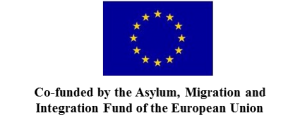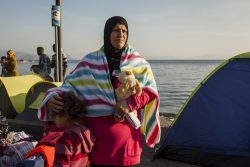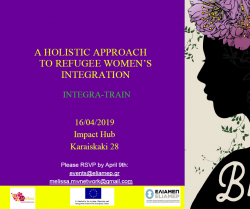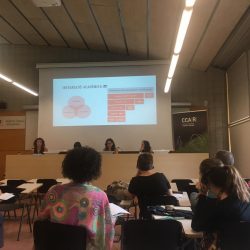In the context of increasing refugee inflows in the European continent it becomes highly relevant to implement practical actions responding to existing gaps in migrant/refugee integration across the EU member states. This project aims to strengthen the integration of women beneficiaries of international protection via the development and implementation of integration training. This aim will be achieved by way of transferring knowledge and experience from member states with longer experience in refugee integration (Spain and Italy) to countries with weaker and less developed integration structures (Bulgaria, Greece and Malta) which are entry points for newcomer refugees and migrants. In view of the unforeseen high numbers of incoming migrants and asylum seekers in Europe the conduct of context-specific orientation courses to facilitate familiarization with the new social, legal, political and cultural environment of member states becomes crucial for fostering the overall integration process that takes course in the longer run.
The project has the following main objectives:
- To foster the integration of refugee women by designing and conducting integration trainings.
- To exchange knowledge and experience at cross national level in the sphere of integration training for refugee women.
- To build the capacity of national NGO and GO stakeholders to offer integration courses to migrant women.
- To increase the preparedness and familiarity of refugee women with the civic, legal, social and cultural realities of their host milieus, as facilitation tool of the longer-term process of integration.
As a result, the project will engage in the following activities:
- Map the training needs of beneficiaries of international protection and the existing mechanisms for training provision in five EU Member States.
- Select existing training modules and manuals from Italy and Spain to serve as example and basis for the development of equivalent material in Bulgaria, Greece and Malta. These materials will provide guidance on what topics/information/contents to include in the trainings as well as guidance on how to conduct the trainings and how to work with specific target groups.
- Conduct two study visits to refugee institutions in Italy and Spain.
- Develop and translate modules and information materials.
- Conduct an international as well as national ‘train the trainer’ seminars.
- Conduct regular trainings.
Project partners:
- Center for the Study of Democracy (project coordinator, Bulgaria)
- ELIAMEP (Greece)
- Melissa: Network of Migrant Women (Greece)
- The People for Change Foundation (Malta)
- Comissió Catalana d’Ajuda al Refugiat (Spain)
- Fondazione Centro Studi Investimenti Sociali (Italy)
- Cooperation for Voluntary Service (Bulgaria)
DELIVERABLES
Since the start of the project, the following deliverables have been produced:
- A national report concluded in July 2017, mapping the training needs of beneficiaries of international protection and the existing mechanisms for training provision in Greece (with focus on women).
This report offered an overview of the existing mechanisms in Greece by looking at the array of stakeholders involved in the process of reception and integration of TNCs, refugees and beneficiaries of international protection in Greece. Along with documenting trends and canvassing the variety of stakeholders and projects, the study offered background information with regards to the peculiarity of socio-political and economic situation in Greece in order to explain the existing difficulties and identify the current challenges with regard to the system of reception and integration. A variety of sources has been used to compile this report: data and information was drawn from the national bodies, the relevant EU agencies, NGOs and other stakeholders, the Greek National Statistics Agency as well as EUROSTAT, in order to sketch a tentative map of the Greek system. Additionally, eight interviews were conducted in order to have a clear picture of the existing provision of information and training in order to formulate a solid outlook on the aspects of training that need to be developed for addressing the integration needs to refugees and refugees and beneficiaries of international protection, and in particular those of women: two interviews were conducted with experts from the Asylum Service, one interview was conducted with an expert from the Greek Forum of Refugees and one interview was conducted with an expert form the Municipality of Athens in charge of the integration and refugee portfolio of the Municipality. Four interviews were conducted with women refugees as well: two from Syria in the process of fast-track asylum application, and two candidates for relocation, one from Syria and one from Iran.
The report found that the main issue in Greece is the lack of systematic efforts in the area of integration of refugees and beneficiaries of international protection. For a variety of reasons – lack of political will and prolonged economic crisis which has greatly affected employment as well as all areas of welfare provision – no integrated system of integration of migrants has been implemented in the past thirty years, that is since Greece started receiving larger waves of migrants, culminating into the 2015-2016 refugee crisis. Also due to the nature of the emergency of the refugee crisis, emphasis has been put on reception – which is a pre-integration phase – rather than on integration per se. Another important factor to take into account is the lack of will of the vast majority of refugees to remain in Greece: the vast majority feels trapped in Greece and still hopes to find a way to continue their journey towards their preferred country of destination, an element which impedes both short term as well as long term integration. The report found that the most urgent and fundamental training need to be addressed is language learning. Language learning is sporadic and entirely dependent on NGOs for the time being. This cannot guarantee the continuity of classes and progression to the next level of learning (as courses tend to address the immediate need to survival or basic Greek) whilst it does not guarantee certification either. Moreover, legal, cultural and civic orientation is necessary. Most of the population lives in camps and have few opportunities of accustoming themselves to the Greek context. Specifically for women, special education on their legal rights needs to be provided, as well as orientation on the role of women in Western societies – many women come from countries where the role of women is very different to the European context. Awareness of exploitation specifically about women should also be given priority as well as knowledge of the legal context and welfare structures providing protection from sexual and gender-based violence. Vocational training should come after all these other steps have been taken following a survey of labour market needs in Greece, to give realistic possibilities of employment. Most importantly, however, all these efforts must become part of an integrated plan: integration is a longer and more complex issue than reception and response to emergency, involving all sectors of the host society and, hence, synergies with all stakeholders but also central coordination and specific aims and objectives to be reached are of paramount importance.
- A training module (in Greek and in English) focused directly to adult and young women, asylum seekers and beneficiaries of international protections regardless of the country of origin, but it can be also used as tool for consultation by trainers and by representatives of municipalities and other relevant institutions. Such module does not currently exist in Greece, so in that sense, it is necessary and will cover an important gap in integration efforts. The module a holistic rather than procedural and service-oriented approach. The philosophy underlying the module submits that continuous education in citizenship is a far more efficient integration strategy in comparison to service-oriented approaches as services themselves are absorbed by beneficiaries on a much higher degree when the host society and its institutions are understood and made familiar to the newcomers. In this way, beneficiaries are not envisaged as passive recipients of services but as active citizens with equal rights and opportunities of participation.
Contact:
For further information, please contact Rosa Vasilaki







